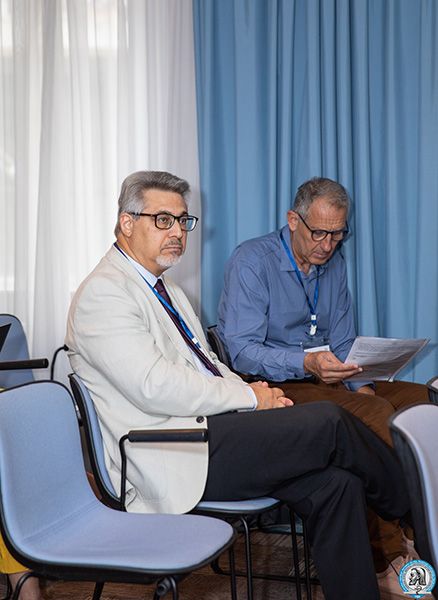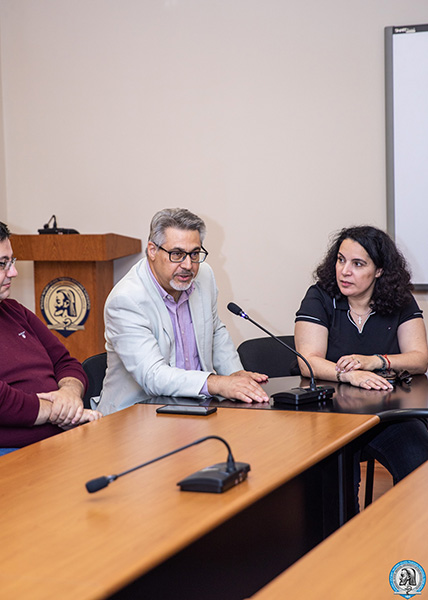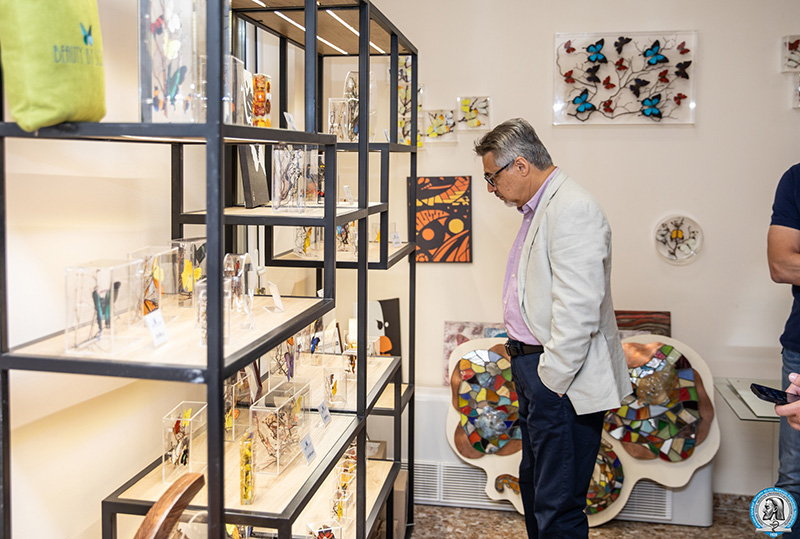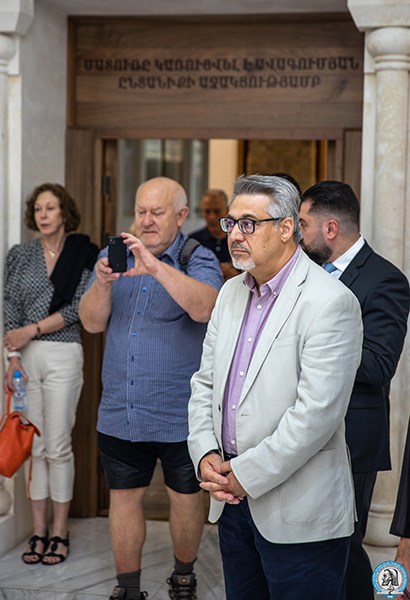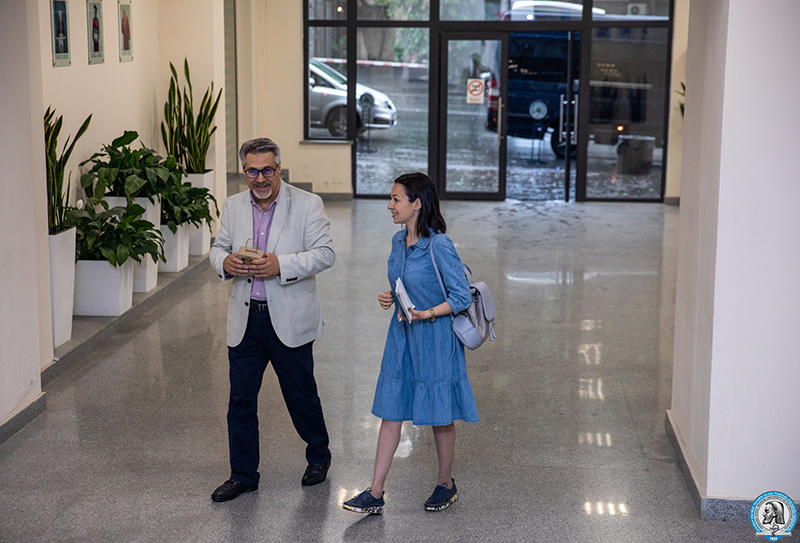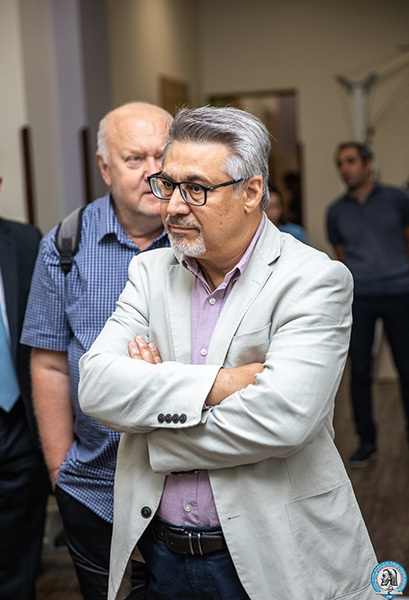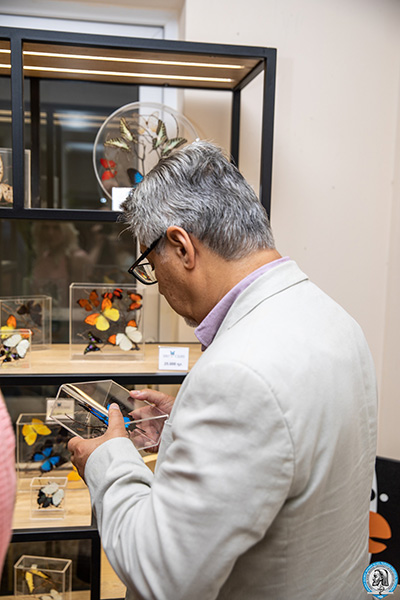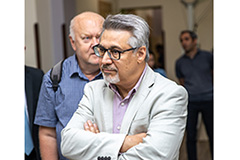 |
23.08.2023Constantinos Deltas: Armenian and Cypriot geneticists have potential for productive collaboration |
Professor Constantinos Deltas, the specialist at the Center of Excellence in Biobanking and Biomedical Research University in Cyprus; is sure - Armenian and Cypriot geneticists need to identify a niche where a collaboration will be most promising and productive.
Within the framework of YSMU ARICE project, the specialist attended the international conference entitled "Cancer Research and Current Molecular Testing in Application", presenting the modern methods of lung cancer diagnosis and treatment.
We spoke with the professor about the great influence of the field of genetics on society, the importance of the profession of a geneticist, the creation of the Cypriot biobank, as well as the prospects of cooperation between Armenian and Cypriot specialists within the framework of the YSMU ARICE project.
- Professor, why is understanding genetics important for scientists?
- Every human trait and every human behavior are the result of the interaction between our genetic makeup, our DNA, and the environment in all its variable expression and variety. Monogenic diseases, caused by pathogenic variants in single genes are on one edge of the spectrum and more complex phenotypes such as diabetes, heart conditions, many cancers and psychiatric conditions are at the other end of the phenotypic spectrum. The influence of genetic variants on all these is a very complicated and there is an endless effort by thousands of scientists around the world to delineate how DNA is responsible for the end-result, the phenotype, the expression of any single trait, simple or complex. Nature has worked through evolution and natural selection for millions of years to format life and its various expressions in the millions of species, including humans. Trying to understand the driving forces and the logic behind every trait, and most importantly behind human disease, during a single lifetime of research, or more than one, is a challenge and a daunting task. But nevertheless, there is no other way to design therapeutic interventions for easing human suffering. Amongst the most interesting challenges is the fight against the hostile environment, which includes innumerous types of lower forms of life, as represented by microbes and viruses. Finally, understanding how DNA and genetics operate will empower us to interfere and improve the quality of life in the next generations.
- Why did you choose the profession of a geneticist?
- During my studies for my first academic degree in Pharmacy, I came to understand biochemistry, a fascinating field concerning the chemistry of living organisms. I felt attracted to it with an absolute strength which led me to pursue my PhD in biochemistry, through which I was then educated and trained in molecular biology, which I chose to apply in the field of human genetics. It is a medical area where one can pursue basic and translational research, serving the patient while making new discoveries. The concept of a gene itself, encoded using only four genetic letters in the genetic code, which is universal for all living organisms, is of fundamental significance and one that deserves our attention.
- How has the society changed through our understanding of genetics?
- Understanding genetics and the language of DNA led to the discovery of methods and tools that enabled better and accurate diagnosis of disease, prevention and design of new medicines to better life. Genetics allowed the understanding of the molecular and cellular basis of disease, which in turn led to the targeted design of medications which are saving millions of lives on earth, while contributing to what I call an evolutionary process based not on natural selection but based on human logical selection, going against nature. The best most recent example of global interest is the COVID-19 pandemic. If humankind was solely left on the hands of natural selection, a significant portion of the entire global population would have died unable to fight the corona virus SARS-CoV-2. Modern technologies and genetic engineering tools designed through human intelligence led to the preparation of vaccines that went against natural selection, as it would have worked 100 years ago.
- What societal changes could occur in the future through our understanding of genetics?
- Better medications, less toxic, more effective, safer, with less side effects and adverse reactions, not only aimed at improving quality of life but also extending healthy ageing and human lifespan. Public health will be a commodity for all fellow citizens around the world, with less competition and animosity between countries. Understanding genetics will make life easier in an environment which is very hostile, in competition with other forms of life and especially those which are much lower in the evolutionary scale but much more difficult to fight, including bacteria and viruses.
- What are you working on right now?
- I am founder and director of the biobank.cy Center of Excellence in Biobanking and Biomedical Research, with the following major objectives: a) Preparing and developing the Biobank of Cyprus, as a medical research infrastructure to upgrade research capacity and prepare Cyprus for the next generation of Biomedical Research. We hope that this will enable for the first-time studies aimed at better diagnosis, prognosis and prevention of diseases, while improving public health. b) Deliver for the first time the Cypriot human genome, the CYPROME, as a tool to support genetic and epidemiological studies across all medical disciplines. The first 1000 whole exomes of Cypriots are already available. c) Implement new diagnostic services and satisfy unmet needs in the various medical fields, including both monogenic Mendelian disorders as well as more complex multifactorial ones, for which there is still a fertile field to delve into. d) Facilitate and offer training and education to the current and the next generation of young researchers, using contemporary technology and advice in a friendly and stimulating environment.
- Could you share your impressions from the recent working visit to Yerevan State Medical University?
- I was happy to meet a very friendly and warm environment with people who are inspired by medical science and dedicated to serving human patients. I had the opportunity to tour around the modern facilities of the Yerevan State Medical University and participate in a one-day conference on cancer. I would like to think that we will be able to find ways to collaborate with geneticists at Yerevan in tackling problems of common interest.
- Please, tell about your further scientific collaboration with Armenian specialists within the framework of the YSMU ARICE project?
- It would be nice to explore material and data in both our countries and see if we can pursue a research program of common interest. To do this effectively we may need to follow up with additional exchange visits. We need to identify a niche where a collaboration will be most promising and productive.
- Would you like to add something?
- Thank you for this opportunity to communicate with Armenian colleagues.
